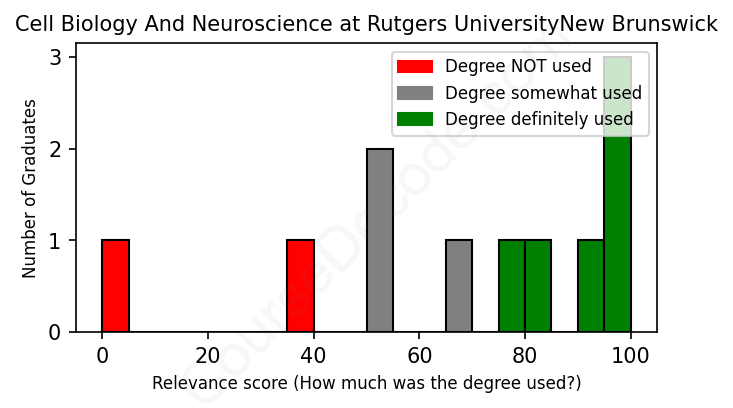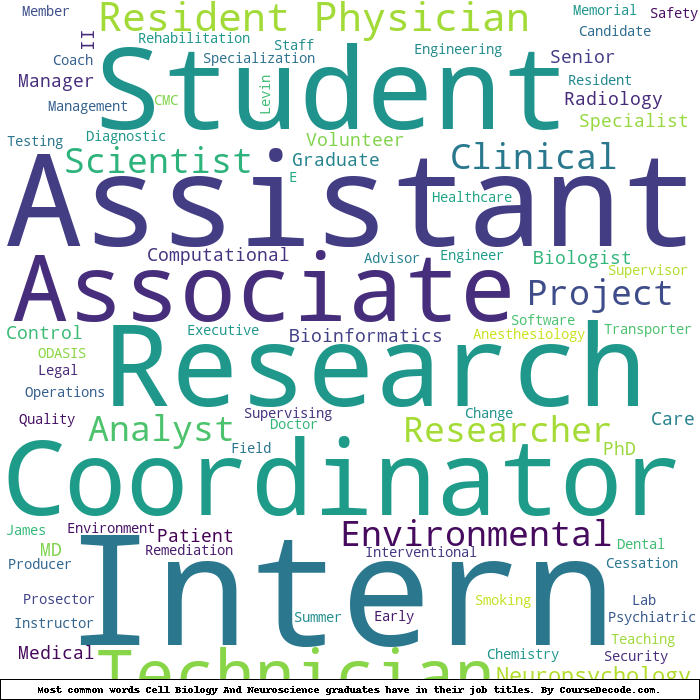
First, some facts. Of the Cell Biology And Neuroscience graduates from Rutgers UniversityNew Brunswick we've analyzed , here's how many have used (or NOT used) their degree in their career:

These are estimates based on AI analysis of 11 LinkedIn profiles (see below).
The verdict? Slightly above average. Overall, with an average relevance score of 68%, Cell Biology And Neuroscience graduates from Rutgers UniversityNew Brunswick have a slightly higher likelihood (+1%) of finding work in this field compared to the average graduate across all fields:
And for comparison, here's the chart for all profiles we've looked at across all degrees.
Also, after graduating, 72% of these graduates have pursued further education other than another Bachelor's degree (such as a Masters degree or other), compared to the average across all profiles of 35%. This suggests you may need more than just a Bachelors degree to be competitive as a Cell Biology And Neuroscience graduate.
See the details:
|
Relevance score: 91% We think this person has gone into a career highly relevant to their degree. We think this person has gone into a career highly relevant to their degree.
DEGREE INFOGraduated in 2020 from Rutgers UniversityNew Brunswick with a Bachelor of Arts - BA in Cell Biology And Neuroscience. Also pursued further education since (see below). JOB HISTORY SINCE GRADUATIONClinical Neuropsychology Intern/Volunteer New York Football Giants May 2022 - Jun 2022 Clinical Neuropsychology Intern/Volunteer  New York Islanders Sep 2022 - Sep 2022 Clinical Neuropsychology Testing Technician  Dr. Kenneth Perrine Sep 2020 - Feb 2023 Rehabilitation Technician  TruMotion Physical Therapy Feb 2023 - Aug 2023 FURTHER DEGREES DONE SINCE GRADUATINGPsy.D.Kean University 2023 - 2028 ABOUTI am a first year Psy.D. student and doctoral assistant in the combined school and clinical psychology program at Kean University. I graduated from Rutgers University-New Brunswick in 2020 with my Bachelor's in Cell Biology and Neuroscience. I am a huge sports fan fascinated by neuroscience, clinical neuropsychology, and sports psychology. |
The top 10 most common jobs done by the graduates we've analyzed (ranked most common to least) are:
Based on the LinkedIn profiles analyzed, it seems that graduates with a degree in Cell Biology and Neuroscience from Rutgers University have ventured into a mix of careers. The most common roles they pursued include positions in the medical and healthcare fields, like Resident Physicians and Patient Care Technicians, as well as research-oriented roles such as Student Researchers and Clinical Neuropsychology Interns. Many of these jobs utilized skills and knowledge from their degree, particularly in the areas of direct patient care, medical research, and quality control within the life sciences. However, there are also a significant number of graduates who ended up in positions that, while depending on analytical skills, did not require specific knowledge in cell biology or neuroscience, like Software Engineering and various administrative roles.
Overall, while many of the positions held by these graduates are related to their degree in meaningful ways, some are less relevant and don't fully leverage their specialized training. For instance, jobs like Patient Transporter and Lab Safety Specialist, while important, don't require the in-depth biological and neurological understanding that a Cell Biology and Neuroscience degree offers. Conversely, roles like Diagnostic Radiology Resident and Clinical Neuropsychology Intern showcase how well the knowledge from their studies can translate into practical applications in the medical field. In short, there's a solid correlation between their degree and the relevancy of their jobs, particularly in healthcare and research, but a bit of a scatter when it comes to roles outside those domains.
Here is a visual representation of the most common words in job titles for Cell Biology And Neuroscience graduates (this is across all Cell Biology And Neuroscience graduates we've analyzed, not just those who went to Rutgers UniversityNew Brunswick):

When you look at the career trajectories of graduates from the Cell Biology and Neuroscience program at Rutgers University-New Brunswick, you see a mix of paths, but many stay relevant to the field in some way. Right after graduation, a lot of them seem to land jobs in healthcare or research roles, such as Patient Care Technicians or lab-related positions. This type of work helps them gain practical experience and build connections, which can be super important as they start their careers. In the early years, internships and assistant roles in research labs or healthcare facilities are common, showing that many graduates are focused on honing their skills and finding their niche.
Fast forward five to ten years after graduation, and you can see that many of these individuals have made significant strides in their careers. Some move on to specialized medical roles like resident physicians or surgical coordinators, indicating a strong progression toward advanced healthcare positions. Others branch out into research coordination or technical roles in companies, hinting at flexibility in their careers. While there are always a few who may gravitate towards jobs that aren't directly tied to their degrees, it's evident that many graduates are making solid career choices that are closely linked to their studies in Cell Biology and Neuroscience. Overall, it seems like a lot of them are doing pretty well, with a good mix of roles that reflect their educational background and interests.
So, diving into a Bachelor’s degree in Cell Biology and Neuroscience at Rutgers University-New Brunswick can definitely be a challenge, but it really depends on your interests and strengths. This program digs deep into complex topics like genetics, molecular biology, and the nervous system, which can get pretty intense. You'll probably find yourself juggling lab work, research projects, and exams that require a solid grasp of some tough material. If you enjoy science and have a knack for studying, you might find it manageable, but it’s definitely not a walk in the park. Overall, it's a bit harder than the average degree, especially if you’re not super into the nitty-gritty of biological sciences. But hey, if you're passionate, that passion can make all the difference!
Most commonly, in the LinkedIn profiles we've looked at, it takes people 4 years to finish a Bachelor degree in Cell Biology And Neuroscience.
Looking at the career paths of these Rutgers graduates, it seems like they’re heading in a decent direction, but there's a mix of incomes based on their jobs. The ones in healthcare, like the Diagnostic Radiology Resident and Anesthesiology Resident, are probably raking in a good amount since medical residents typically earn a competitive salary, especially as they progress in their training. On the flip side, some of the earlier jobs like Patient Care Technician and Research Assistant don't pay as well, especially those starting straight out of college. Overall, it looks like the graduates further along in their careers or those in high-demand fields like medicine, engineering, or specialized research are likely doing well financially, while recent grads are probably still climbing the ladder, earning solid but not super flashy salaries just yet.
Here is a visual representation of the most common words seen in the "about" section of LinkedIn profiles who have a Bachelor degree in Cell Biology And Neuroscience (this is across all Cell Biology And Neuroscience graduates we've analyzed, not just those who went to Rutgers UniversityNew Brunswick). This may or may not be useful:

Here are all colleges offering a Bachelor degree in Cell Biology And Neuroscience (ordered by the average relevance score of their Cell Biology And Neuroscience graduates, best to worst) where we have analyzed at least 10 of their graduates:
| College | Score | Count |
|---|---|---|
 Rutgers UniversityNew Brunswick Rutgers UniversityNew Brunswick
|
68 | 11 |